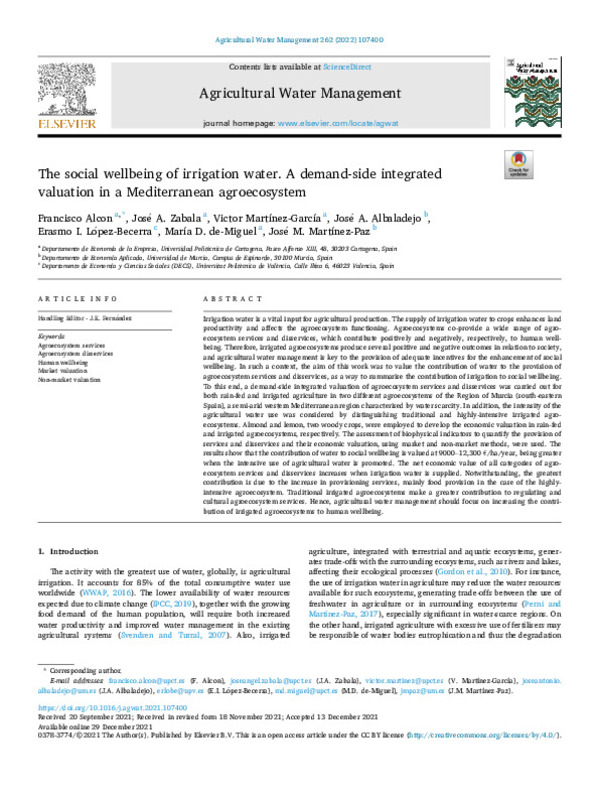JavaScript is disabled for your browser. Some features of this site may not work without it.
Buscar en RiuNet
Listar
Mi cuenta
Estadísticas
Ayuda RiuNet
Admin. UPV
The social wellbeing of irrigation water. A demand-side integrated valuation in a Mediterranean agroecosystem
Mostrar el registro sencillo del ítem
Ficheros en el ítem
| dc.contributor.author | Alcon, F.
|
es_ES |
| dc.contributor.author | Zabala, J.A.
|
es_ES |
| dc.contributor.author | Matínez-García, V.
|
es_ES |
| dc.contributor.author | Albaladejo, J.A.
|
es_ES |
| dc.contributor.author | López-Becerra, E.I.
|
es_ES |
| dc.contributor.author | de Miguel, María Dolores
|
es_ES |
| dc.contributor.author | Martínez-Paz, José Miguel
|
es_ES |
| dc.date.accessioned | 2023-06-06T18:01:57Z | |
| dc.date.available | 2023-06-06T18:01:57Z | |
| dc.date.issued | 2022-03-31 | es_ES |
| dc.identifier.issn | 0378-3774 | es_ES |
| dc.identifier.uri | http://hdl.handle.net/10251/193922 | |
| dc.description.abstract | [EN] Irrigation water is a vital input for agricultural production. The supply of irrigation water to crops enhances land productivity and affects the agroecosystem functioning. Agroecosystems co-provide a wide range of agroecosystem services and disservices, which contribute positively and negatively, respectively, to human wellbeing. Therefore, irrigated agroecosystems produce several positive and negative outcomes in relation to society, and agricultural water management is key to the provision of adequate incentives for the enhancement of social wellbeing. In such a context, the aim of this work was to value the contribution of water to the provision of agroecosystem services and disservices, as a way to summarise the contribution of irrigation to social wellbeing. To this end, a demand-side integrated valuation of agroecosystem services and disservices was carried out for both rain-fed and irrigated agriculture in two different agroecosystems of the Region of Murcia (south-eastern Spain), a semi-arid western Mediterranean region characterised by water scarcity. In addition, the intensity of the agricultural water use was considered by distinguishing traditional and highly-intensive irrigated agroecosystems. Almond and lemon, two woody crops, were employed to develop the economic valuation in rain-fed and irrigated agroecosystems, respectively. The assessment of biophysical indicators to quantify the provision of services and disservices and their economic valuation, using market and non-market methods, were used. The results show that the contribution of water to social wellbeing is valued at 9000-12,300 euro/ha/year, being greater when the intensive use of agricultural water is promoted. The net economic value of all categories of agroecosystem services and disservices increases when irrigation water is supplied. Notwithstanding, the greatest contribution is due to the increase in provisioning services, mainly food provision in the case of the highly-intensive agroecosystem. Traditional irrigated agroecosystems make a greater contribution to regulating and cultural agroecosystem services. Hence, agricultural water management should focus on increasing the contribution of irrigated agroecosystems to human wellbeing. | es_ES |
| dc.description.sponsorship | This work was supported by the AgriCambio project (Grant PID2020- 114576RB-I00 funded by MCIN/AEI/ 10.13039/501100011033). Jos¿e A. Zabala, Víctor Martínez-García and Jos¿e A. Albaladejo-García acknowledge the financial support from the Spanish Ministry of Education and Personal Training (FPU 16/03473; FPU19/05143; FPU 16/ 03562) | es_ES |
| dc.language | Inglés | es_ES |
| dc.publisher | Elsevier | es_ES |
| dc.relation.ispartof | Agricultural Water Management | es_ES |
| dc.rights | Reconocimiento (by) | es_ES |
| dc.subject | Agroecosystems services | es_ES |
| dc.subject | Agroecosystem disservices | es_ES |
| dc.subject | Human Wellbeing | es_ES |
| dc.subject | Market valuation | es_ES |
| dc.subject | Non-market valuation | es_ES |
| dc.subject.classification | ECONOMIA, SOCIOLOGIA Y POLITICA AGRARIA | es_ES |
| dc.title | The social wellbeing of irrigation water. A demand-side integrated valuation in a Mediterranean agroecosystem | es_ES |
| dc.type | Artículo | es_ES |
| dc.identifier.doi | 10.1016/j.agwat.2021.107400 | es_ES |
| dc.relation.projectID | info:eu-repo/grantAgreement/AEI/Plan Estatal de Investigación Científica y Técnica y de Innovación 2017-2020/PID2020-114576RB-I00/ES/EVALUACION SOCIO ECONOMICA DE LA ADAPTACION AL CAMBIO CLIMATICO DE LA AGRICULTURA DE REGADIO EN CUENCAS SEMIARIDAS/ | es_ES |
| dc.relation.projectID | info:eu-repo/grantAgreement/MECD//FPU 19%2F05143/ | es_ES |
| dc.relation.projectID | info:eu-repo/grantAgreement/MECD//FPU16%2F03473/ES/FPU16%2F03473/ | es_ES |
| dc.relation.projectID | info:eu-repo/grantAgreement/MECD//FPU 16%2F03562/ | es_ES |
| dc.relation.projectID | info:eu-repo/grantAgreement/MECD//FPU16%2F03562/ES/FPU16%2F03562/ | es_ES |
| dc.relation.projectID | info:eu-repo/grantAgreement/MECD//FPU 16%2F03473/ | es_ES |
| dc.relation.projectID | info:eu-repo/grantAgreement/MICINN//PID2020-114576RB-I00//AgriCambio/ | es_ES |
| dc.rights.accessRights | Abierto | es_ES |
| dc.contributor.affiliation | Universitat Politècnica de València. Escuela Técnica Superior de Ingeniería Agronómica y del Medio Natural - Escola Tècnica Superior d'Enginyeria Agronòmica i del Medi Natural | es_ES |
| dc.description.bibliographicCitation | Alcon, F.; Zabala, J.; Matínez-García, V.; Albaladejo, J.; López-Becerra, E.; De Miguel, MD.; Martínez-Paz, JM. (2022). The social wellbeing of irrigation water. A demand-side integrated valuation in a Mediterranean agroecosystem. Agricultural Water Management. 262. https://doi.org/10.1016/j.agwat.2021.107400 | es_ES |
| dc.description.accrualMethod | S | es_ES |
| dc.relation.publisherversion | https://doi.org/10.1016/j.agwat.2021.107400 | es_ES |
| dc.type.version | info:eu-repo/semantics/publishedVersion | es_ES |
| dc.description.volume | 262 | es_ES |
| dc.relation.pasarela | S\456643 | es_ES |
| dc.contributor.funder | Ministerio de Ciencia e Innovación | es_ES |
| dc.contributor.funder | Ministerio de Educación, Cultura y Deporte | es_ES |
| dc.subject.ods | 12.- Garantizar las pautas de consumo y de producción sostenibles | es_ES |
| dc.subject.ods | 13.- Tomar medidas urgentes para combatir el cambio climático y sus efectos | es_ES |
| dc.subject.ods | 15.- Proteger, restaurar y promover la utilización sostenible de los ecosistemas terrestres, gestionar de manera sostenible los bosques, combatir la desertificación y detener y revertir la degradación de la tierra, y frenar la pérdida de diversidad biológica | es_ES |








